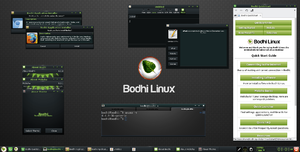Bodhi Linux

Bodhi Linux 4.0.0
|
|
| Developer | Bodhi Linux Team |
|---|---|
| OS family | Unix-like |
| Working state | Current |
| Source model | Open source |
| Initial release | 26 March 2011 |
| Latest release | 4.1.0 / 27 January 2017 |
| Update method | APT (front-ends available) |
| Package manager | dpkg (front-ends like Synaptic available) |
| Platforms |
IA-32, x86-64 (formerly ARM too) |
| Kernel type | Monolithic (Linux kernel) |
| Userland | GNU |
| Default user interface | Moksha |
| License | Free software licenses (mainly GPL), plus proprietary binary blobs |
| Official website | bodhilinux |
Bodhi Linux is a lightweight Linux distribution based on Ubuntu that uses the Moksha window manager. The philosophy for the distribution is to provide a minimal base system so that users can populate it with the software they want. Thus, by default it only includes software that is essential to most Linux users, including a file browser (PCManFM), a web browser (Midori) and a terminal emulator (Terminology). It does not include software or features that its developers deem unnecessary. To make populating systems with software easy, Bodhi Linux developers maintain an online database of lightweight software that can be installed in one click via apturl.
In addition to the standard version of Bodhi Linux, which is for Intel-compatible processors, there was an alpha release version for tablet devices with ARM processors, based on Debian. The tablet device version of Bodhi is not officially supported anymore, because of the amount of time needed to keep it up to date. Package and image updates will rarely be made, if at all, in the future.
System requirements include 128 MB RAM, 2.5 GB hard disk space, and a 300 MHz processor. 32 bit processors without PAE capability are supported on same terms as PAE-enabled ones. Only difference between the Bodhi versions is that an older kernel is used.
By using an Enlightenment DR17-based fork called Moksha Desktop, Bodhi provides rich desktop effects and animations that do not require high end computer hardware. The rationale for forking the project from DR17 was due to its established performance & functionality while E19 possessed "optimizations that break existing features users enjoy and use" as per Jeff Hoogland's statement. The Enlightenment window manager, as well as the tools developed specifically for Bodhi Linux, were written in C programming language and Python.
...
Wikipedia
